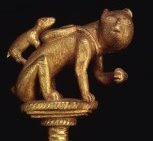I found one web page by an anthropologist, Phil Bartle, who lived in Ghana. He wrote about the word linguist and the linguist's role:
In Akan, the word "okyeame" means something much more than "linguist" (as it is usually translated). The linguist is a spokesperson, ambassador, diplomat, interpreter, confidant, advisor and assistant to an elder or chief... In court, all prayers are in the form of libations, pouring of palm wine or schnapps on the ground to the gods and ancestors, and they are always done by linguists or individuals acting the role of linguists. As the person of the chief is sacred, possessed by matrilineal ancestors, members of the public cannot speak directly to the chief, and the linguist must be used as an intermediary. Very often, if frank expressions are used, the okyeame puts them into more polite and less offensive language. The elders in a chief’s court are sometimes said to be speaking the "language of the dead," which sometimes mean they speak using traditional proverbs, and may hide their deliberations from the public who are unlikely to know what those proverbs can imply.This page has the most complete description of these tribal rituals and activities that I have found.
Additional interesting web pages:
 From the Metropolitan Museum of Art: a gold-covered staff showing two men and a spider web: "This staff is surmounted by two human figures flanking a large web, with a spider positioned at its center. The finial refers to the saying, 'No one goes to the house of the spider Ananse to teach him wisdom.' Ananse the spider, who brought wisdom and taught weaving to the Akan, is the originator of folk tales and proverbs and is thus linked to linguists. Here, Ananse is the ultimate repository of erudition, as is the linguist at an Akan court, neither of whom should be challenged in that domain."
From the Metropolitan Museum of Art: a gold-covered staff showing two men and a spider web: "This staff is surmounted by two human figures flanking a large web, with a spider positioned at its center. The finial refers to the saying, 'No one goes to the house of the spider Ananse to teach him wisdom.' Ananse the spider, who brought wisdom and taught weaving to the Akan, is the originator of folk tales and proverbs and is thus linked to linguists. Here, Ananse is the ultimate repository of erudition, as is the linguist at an Akan court, neither of whom should be challenged in that domain."- From Hamill Gallery: a page with photos of former and current linguist staffs for sale.
 From the Art Institute of Chicago: A page with some historic information: in particular, the fact that the illustration of proverbs on linguist staffs originated in the 1920s. The staff depicted on this page illustrates "The hen knows when it is dawn, but leaves it to the rooster to announce." Explanation: "While on one level it is a reference to relations between men and women, the saying held an even deeper meaning for the Asante: the contrast of the decision-making power of a chief (the rooster) with the wisdom of the elders (the hen) and the need for linguists’ diplomacy in mediating between the two."
From the Art Institute of Chicago: A page with some historic information: in particular, the fact that the illustration of proverbs on linguist staffs originated in the 1920s. The staff depicted on this page illustrates "The hen knows when it is dawn, but leaves it to the rooster to announce." Explanation: "While on one level it is a reference to relations between men and women, the saying held an even deeper meaning for the Asante: the contrast of the decision-making power of a chief (the rooster) with the wisdom of the elders (the hen) and the need for linguists’ diplomacy in mediating between the two."  From the Brooklyn Museum: staff whose finial shows a cat and mouse: "a reference to the proverb, 'It is only a foolish mouse that tries to get into the cat's bag.' In other words, it is a foolish person who dares to meddle in the king's business."
From the Brooklyn Museum: staff whose finial shows a cat and mouse: "a reference to the proverb, 'It is only a foolish mouse that tries to get into the cat's bag.' In other words, it is a foolish person who dares to meddle in the king's business."
No comments:
Post a Comment